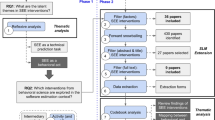Abstract
Estimating the effort required to complete web-development projects involves input from people in both technical (e.g., programming), and non-technical (e.g., user interaction design) roles. This paper examines how the employees' role and type of competence may affect their estimation strategy and performance. An analysis of actual web-development project data and results from an experiment suggest that people with technical competence provided less realistic project effort estimates than those with less technical competence. This means that more knowledge about how to implement a requirement specification does not always lead to better estimation performance. We discuss, amongst others, two possible reasons for this observation: (1) Technical competence induces a bottom-up, construction-based estimation strategy, while lack of this competence induces a more “outside” view of the project, using a top-down estimation strategy. An “outside” view may encourage greater use of the history of previous projects and reduce the bias towards over-optimism. (2) Software professionals in technical roles perceive that they are evaluated as more skilled when providing low effort estimates. A consequence of our findings is that the choice of estimation strategy, estimation evaluation criteria and feedback are important aspects to consider when seeking to improve estimation accuracy.
Similar content being viewed by others
References
Aronson, E., Wilson, T. D., et al. 1999. Social Psychology. Addison-Wesley Educational Publishers Inc.
Atkinson, K., and Shepperd, M. 1994. Using function points to find cost analogies. European Software Cost Modeling Meeting. Ivrea, Italy.
Boehm, B. 1984. Software engineering economics. IEEE Trans. Softw. Eng. 10(1): 4-21.
Bowden, P., Hargreaves, M., et al. 2000. Estimation support by lexical analysis of requirement documents. J. Syst. Softw. 51: 87-98.
Buehler, R., Griffin, D., et al. 1994. Exploring the “Planning fallacy”: Why people underestimate their task completion times. J. Pers. Soc. Psychol. 67(3): 366-381.
Christensen, R. 1998. Analysis of Variance, Design and Regression. Applied Statistical Methods. Chapman & Hall/Crc.
Cohen, J. 1969. Statistical Power Analysis for the Behavioral Sciences. New York: Academic Press, Inc.
Heemstra, F. J., and Kusters, R. J. 1991. Function point analysis: Evaluation of a software cost estimation model. Eur. J. Inf. Syst. 1(4): 223-237.
Henry, R. 1994. The effects of choice and incentives on the overestimation of future performance. Org. Behav. Human Decis. Process. 57: 210-225.
Hughes, R. T. 1996. Expert judgment as an estimating method. Inf. Softw. Technol. (38): 67-75.
Jørgensen, M. 1997. An empirical evaluation of the MkII FPA estimation model. Norwegian Informatics Conference. Voss, Norway, Tapir, Oslo.
Jørgensen, M. 2004a. A review of studies on expert estimation of software development effort. J. Syst. Softw. 70(1–2): 37-60.
Jørgensen, M. 2004b. Top-down and bottom-up expert estimation of software development effort.” J. Inf. Softw. Technol. 46(1): 3-16.
Jørgensen, M., and Sjøberg, D. I. K. 2001. Impact of software effort estimation on software work. J. Inf. Softw. Technol. 43: 939-948.
Jørgensen, M., and Sjøberg, D. I. K. 2002. Impact of experience on maintenance skills. J. Softw. Maint. Evolut.: Res. Pract. 14: 1-24.
Kitchenham, B. 1996. Software Metrics: Measurement for Software Process Improvement. Oxford: NCC Blackwell.
Kitchenham, B., Pfleeger, S. L., et al. 2002. An empirical study of maintenance and development estimation accuracy. J. Syst. Softw. 64: 57-77.
Kusters, R. J., Genuchten, M. J. I. M., et al. 1990. Are software cost-estimation models accurate? Inf. Softw. Technol. 32(3): 187-190.
Lederer, A. L., and Prasad, J. 2000. Software management and cost estimation error. J. Syst. Softw. 50: 33-42.
Lichtenstein, S., and Fischhoff, B. 1977. Do those who know more also know more about how much they know? Org. Behav. Human Perform. 20: 159-183.
McDonald, A., and Welland, R. 2001. Web engineering in practice. Proceedings of the Fourth WWW10 Workshop on Web Engineering.
Moløkken-Østvold, K., and Jørgensen, M. 2003. A review of surveys on software effort estimation. Proceedings of ISESE 2003, IEEE.
Moløkken-Østvold, K., and Jørgensen, M. 2004. Group processes in software effort estimation. Empirical Software Engineering. 9(4): 315-334.
Moses, J., and Clifford, J. 2000. Learning how to improve effort estimation in small software development companies. 24th Annual International Computer Software and Applications Conference. Taipei, Taiwan, IEEE Comput. Soc, Los Alamitos, CA, USA.
Mukhopadhyay, T., Vicinanza, S. S., et al. 1992. Examining the feasibility of a case-based reasoning model for software effort estimation. MIS Quarterly June, 155-171.
Myrtveit, I., and Stensrud, E. 1999. A controlled experiment to assess the benefits of estimating with analogy and regression models. IEEE Trans. Softw. Eng. 25: 510-525.
Ohlsson, N., Wohlin, C., et al. 1998. A project effort estimation study. Inf. Softw. Technol. 40: 831-839.
Pengelly, A. 1995. Performance of effort estimating techniques in current development environments. Softw. Eng. J. September, 162-170.
Reifer, D. J. 2000. Web development: Estimating quick-to-market software. IEEE Softw. 17(6): 57-64.
Rosenfeld, L., and Morville, P. 1998. Information Architecture for the World Wide Web. Sabastopol, O'Reilly and Associates, Inc.
Siegel, S., and Castellan, N. J. 1988. Non-Parametric Statistics for the Behavioral Sciences. McGraw Hill College Div.
Vicinanza, S. S., Mukhopadhyay, T., et al. 1991. Software effort estimation: An exploratory study of expert performance. Inf. Syst. Res. 2(4): 243-262.
Walkerden, F., and Jeffery, R. 1997. Software cost estimation: A review of models, process, and practice. Adv. Comput. 44: 59-125.
Walkerden, F., and Jeffery, R. 1999. An empirical study of analogy-based software effort estimation. J. Empir. Soft. Eng. 4: 135-158.
Whyte, G., and Sebenius, J. K. 1997. The effect of multiple anchors on anchoring in individual and group judgment. Org. Behav. Human Decis. Mak. 69(1): 75-85.
Wiegers, K. E. 1999. Software process improvement in web time. IEEE Softw. 16(4): 78-86.
Wonnacott, T.H., and Wonnacott, R.J. 1990. Introductory Statistics. John Wiley & Sons.
Author information
Authors and Affiliations
Corresponding author
Rights and permissions
About this article
Cite this article
Moløkken, K., Jørgensen, M. Expert Estimation of Web-Development Projects: Are Software Professionals in Technical Roles More Optimistic Than Those in Non-Technical Roles?. Empirical Software Engineering 10, 7–30 (2005). https://doi.org/10.1023/B:EMSE.0000048321.46871.2e
Issue Date:
DOI: https://doi.org/10.1023/B:EMSE.0000048321.46871.2e




